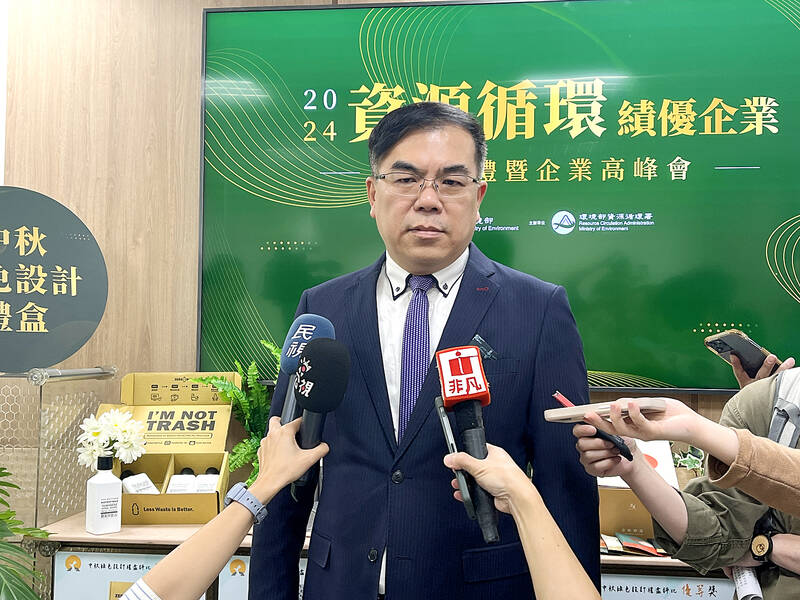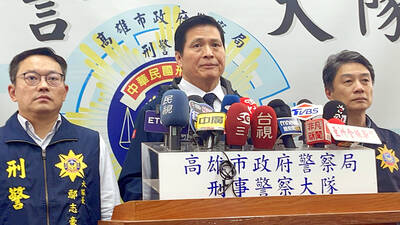The government’s ability to meet carbon reduction goals “would be compromised” by budget cuts, Minister of Environment Peng Chi-ming (彭?明) said yesterday, adding that stricter cap and trade regulations are being planned.
The Ministry of Environment at the end of last year announced a goal of a 28 percent carbon reduction by 2030 compared with 2005 levels.
The National Climate Change Committee last month set additional goals of a 32 percent reduction by 2032 and a 38 percent by 2035.

Photo: Chen Chia-yi, Taipei Times
Many projects are scheduled to start this year, but are likely to stall due to insufficient funding, Peng said.
Carbon reduction targets could fall short by up to 5 percent as a result, he said.
For example, government agencies need to replace systems to improve energy efficiency, but are unable to do so due to insufficient funding, Peng said.
In addition, agencies that offer energy-saving subsidies to support businesses in their energy transition are unable to do so, he said.
Without stable funding, the chance of achieving carbon reduction goals would be significantly compromised, he said.
“Carbon reduction and energy transition require sufficient funding,” he said.
Meanwhile, the carbon fee would proceed as planned, with greenhouse gas cap and trade regulations scheduled for review this year, Peng said.
The ministry aims to launch a pilot program with leading companies by late next year, allowing market-driven carbon pricing, while enforcing stricter emission controls than current self-determined reductions, he said.
Taiwan’s carbon rights regulations have been advancing slowly and he is working to adjust them, Peng said.
The ministry would use nearby countries such as Japan and South Korea as references for cap and trade regulations, he added.
Regulations would be discussed and amended as they involve the deployment of carbon assets, Peng said, adding that the ministry would invite firms with a reputation for excellence — especially those that need international carbon rights — to work together to form an alliance.
With carbon reduction expenses in Taiwan ranging from NT$3,000 to NT$30,000 per tonne, Peng said a better carbon trading mechanism could help Taiwan identify its carbon asset values.
Taiwan’s carbon fee system is to take effect this year, meaning that entities would have to pay carbon fees according to their emissions this year in May next year, the Regulations Governing the Collection of Carbon Fees (碳費收費辦法) say.
The ministry on Saturday announced that large emitters can apply to have their self-determined reduction plans approved.
The value of carbon would be reflected in green finance after the collection of carbon fees, Peng said.

Twenty-four Republican members of the US House of Representatives yesterday introduced a concurrent resolution calling on the US government to abolish the “one China” policy and restore formal diplomatic relations with Taiwan. Led by US representatives Tom Tiffany and Scott Perry, the resolution calls for not only re-establishing formal relations, but also urges the US Trade Representative to negotiate a free-trade agreement (FTA) with Taiwan and for US officials to advocate for Taiwan’s full membership in the UN and other international organizations. In a news release announcing the resolution, Tiffany, who represents a Wisconsin district, called the “one China” policy “outdated, counterproductive

ON PAROLE: The 73-year-old suspect has a criminal record of rape committed when he was serving in the military, as well as robbery and theft, police said The Kaohsiung District Court yesterday approved the detention of a 73-year-old man for allegedly murdering three women. The suspect, surnamed Chang (張), was arrested on Wednesday evening in connection with the death of a 71-year-old woman surnamed Chao (趙). The Kaohsiung City Police Department yesterday also unveiled the identities of two other possible victims in the serial killing case, a 75-year-old woman surnamed Huang (黃), the suspect’s sister-in-law, and a 75-year-old woman surnamed Chang (張), who is not related to the suspect. The case came to light when Chao disappeared after taking the suspect back to his residence on Sunday. Police, upon reviewing CCTV

Johanne Liou (劉喬安), a Taiwanese woman who shot to unwanted fame during the Sunflower movement protests in 2014, was arrested in Boston last month amid US President Donald Trump’s crackdown on illegal immigrants, the Criminal Investigation Bureau (CIB) said yesterday. The arrest of Liou was first made public on the official Web site of US Immigration and Customs Enforcement (ICE) on Tuesday. ICE said Liou was apprehended for overstaying her visa. The Boston Field Office’s Enforcement and Removal Operations (ERO) had arrested Liou, a “fugitive, criminal alien wanted for embezzlement, fraud and drug crimes in Taiwan,” ICE said. Liou was taken into custody

TRUMP ERA: The change has sparked speculation on whether it was related to the new US president’s plan to dismiss more than 1,000 Joe Biden-era appointees The US government has declined to comment on a post that indicated the departure of Laura Rosenberger as chair of the American Institute in Taiwan (AIT). Neither the US Department of State nor the AIT has responded to the Central News Agency’s questions on the matter, after Rosenberger was listed as a former chair on the AIT’s official Web site, with her tenure marked as 2023 to this year. US officials have said previously that they usually do not comment on personnel changes within the government. Rosenberger was appointed head of the AIT in 2023, during the administration of former US president Joe